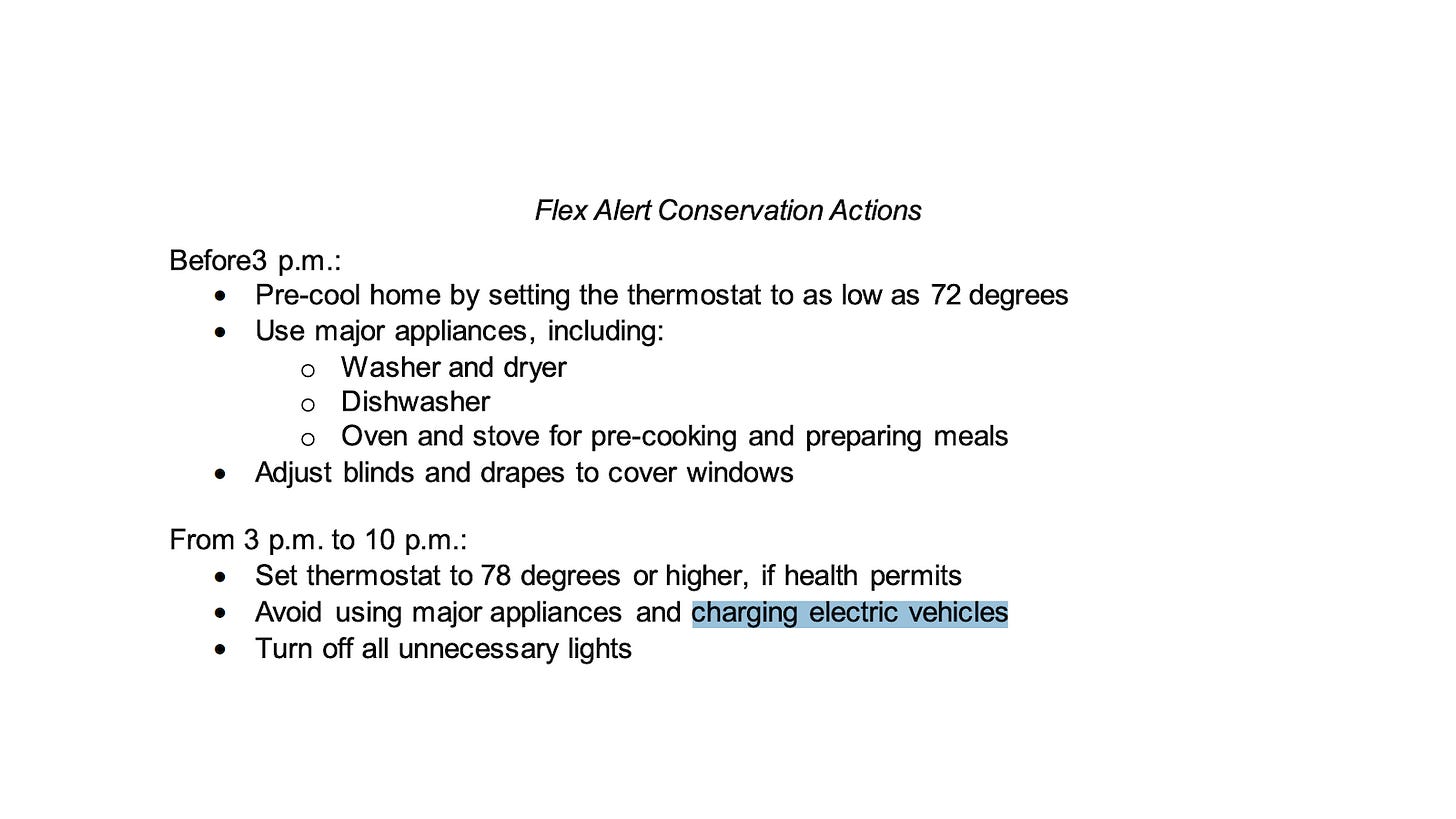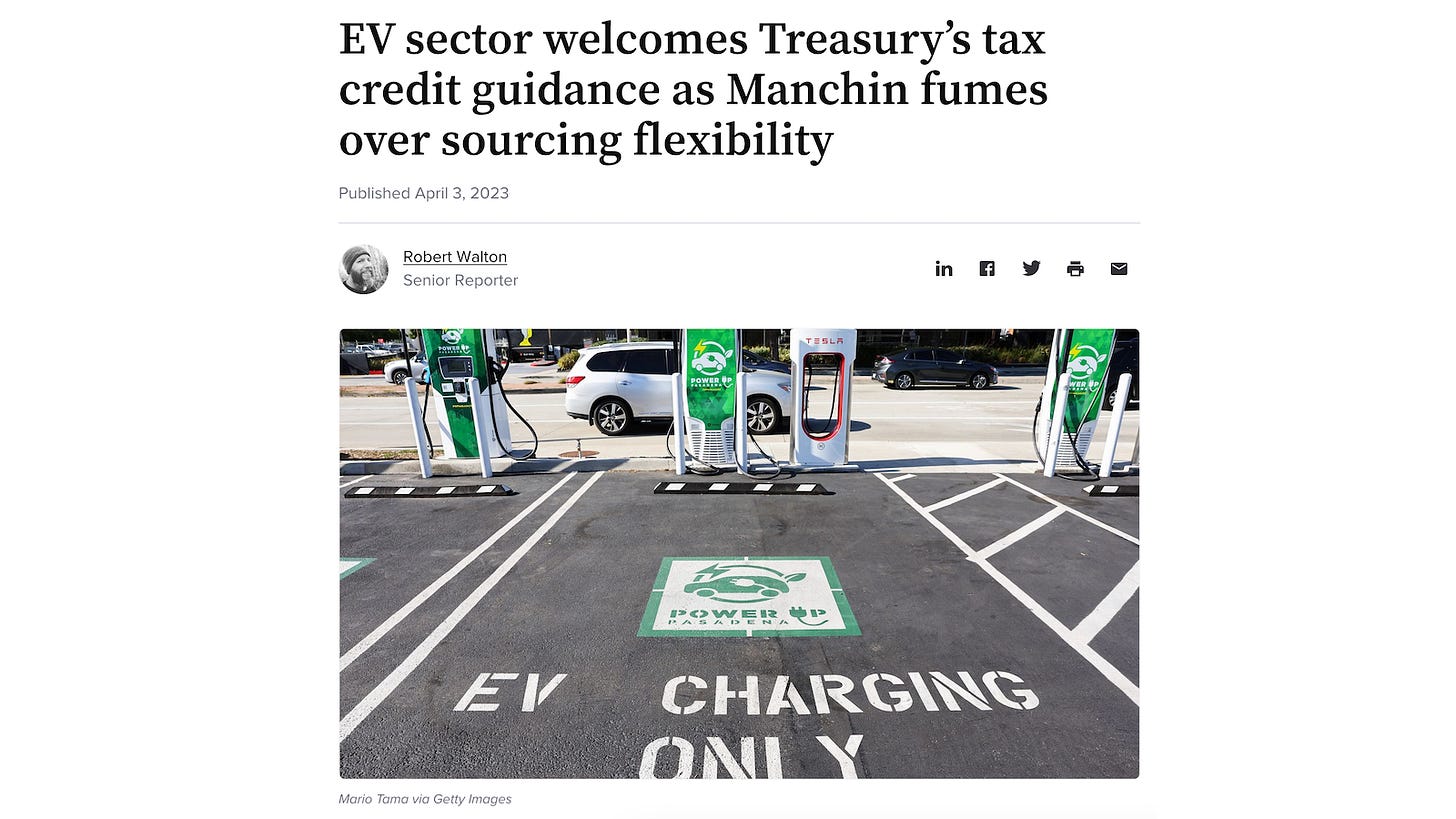Biden's 67% EV policy: a dictatorial attack on the American driver and the US grid
Biden's proposed rules would 1. Force Americans to drive inferior cars, 2. Place massive new demand for reliable electricity on a grid that is declining in reliability
Biden's proposed mandate of 67% EVs in the 2030s is a dictatorial attack on the American driver and the US grid that will
1. Force Americans to drive inferior cars.
2. Place massive new demand for reliable electricity on a grid that is declining in reliable electricity supply.
Biden’s EPA is planning to dictate new emissions regulations for cars that will increase the EV market share of vehicles sold from today’s 6% up to 67% by 2032.1
1. Biden's EV mandate will force Americans to drive more expensive, less capable cars
If EVs were actually as good as their advocates say, they wouldn't require lavish subsidies—let alone Biden's mandate on top of lavish subsidies. Forcing EVs = harming AmericansToday's EVs, despite promises that they would already surpass gasoline vehicles, are not cost-effective for the vast majority of Americans. That's why despite huge government subsidies, only 6% of us buy EVs . Mandating EVs violates our rights and hurts the poor most of all.2
EVs may become even less cost-effective in the future due to rising electricity prices and growing shortages that are occurring as reliable power plants are shut down in favor of unreliable solar and wind, as well as increasing raw material prices (due to artificial, government-created demand for batteries).
Range issues and recharge times are a logistical nightmare, even if you can afford a home recharge station. This is why EV owners tend to use EVs in addition to gasoline cars.
67% EVs would be ruinous for the poor and middle class.3For most Americans, EVs are significantly inferior in utility at a higher price per vehicle.
And if electricity bottlenecks continue, the price disadvantage could worsen while the threat of electricity rationing/restricting for EVs could become real.2. Biden's EV mandate will cause electricity shortages
US power grids are already struggling from retirements of reliable power plant capacity in favor of unreliable solar and wind. Forced electrification of vehicles will exacerbate the problem and make electricity more expensive.4A reliable grid is a foundation of our quality of life. Our lives depend on ultra-reliable electricity for the refrigerators that preserve our food, the water treatment plants that keep our water drinkable, the air conditioning that keeps us cool, the factories that produce our goods, etc.
The root cause of our grid’s reliability problems is simple: America is shutting down too many reliable power plants—plants that can be controlled to produce electricity when needed in the exact quantity needed. And it is attempting to replace them with unreliable solar and wind.
Thanks to government mandates and subsidies, solar and wind—“unreliables”—provide about 13% of American electricity. This 13% has already caused big electricity price increases and huge reliability problems. Instead of admitting this failure, Biden is doubling down.5
The Administration is dictating two deadly policies at the same time:
- Drastically reducing the supply of reliable electricity by shutting down reliable power plants
- Drastically increasing demand for reliable electricity by mandating EVs
This is a recipe for national immobility.Currently the fossil fueled part of the transportation sector consumes about 1/4 of all US energy. This means that to handle a huge influx of EVs, the already fragile electricity sector would have to rapidly add reliable electricity capacity—the opposite of what's happening.6
Biden's EV mandate emulates California's reckless policy, which combines outlawing new oil-fueled vehicles by 2035 and wrecking its grid by shutting down reliable power plants.
As The Babylon Bee put it, “State With No Electricity Orders Everyone To Drive Cars That Run on Electricity.”7California is already having major problems with EV charging. On August 31, 2022, CAISO, the California grid operator, sent out a press release urging consumers to cut electricity usage during a heatwave, including using less air conditioning (!) and refraining from “charging electric vehicles.”8
Note that EV charging is a threat to the California grid while only a small share of CA’s over 30 million vehicles are electric and solar and wind are only a fraction of what they are supposed to become. With less reliable power and far more EVs the situation would be catastrophic.9
Imagine if, during the California blackouts of 2020 or the Texas blackouts of 2021 these grids were both far more dependent on unreliable solar and wind and had a massive fleet of EVs that needed charging. Imagine the death toll and economic damage. That’s where our policies are taking us.
Plans to rely heavily on unreliable solar and wind electricity generation, a key feature of Biden’s plan to power America’s EVs, requires the high voltage transmission system to grow massively in the next few years.
At the current pace of transmission line building, it would take from many decades to centuries to build out our grid. New EV mandates add even more stress to the infrastructure, making everything in the supply chains more expensive while upgrades become more urgent.10
Biden's EV mandate will also make use dependent on foreign supply chains
A crash EV mandate means a rapid, artificial increase in mining, processing, and manufacturing. Since US regulations are hostile to development, this means more dependence on others, especially China.11
The “Inflation Reduction Act” promised additional subsidies for manufacturers who sourced their materials from inside the US, a protectionist policy to build up domestic supply chains. But Biden has systematically blocked US mining opportunities.12
Because of the clear impossibility to source many critical materials from the US, the Treasury Dept has already signaled flexibility in the rules on how the subsidies for domestic production will apply. Which means we will be dependent on others.13
China dominates the supply chains of many critical minerals and given the environmental policies of the Biden administration, this will not change in favor of US mining anytime soon.14
A free-market EV policy
In the future, EVs could benefit Americans and significantly reduce emissions if 1) competition makes them genuinely superior for most people 2) we dramatically increase electricity production using low-cost, reliable, scalable tech—most likely nuclear.If the Biden Administration wants to facilitate cost-effective EVs, the number one thing it needs to do is publicly reverse its attack on reliable power plants that would absolutely destroy our grid for existing electricity needs, let alone huge EV needs.
The proper policy toward battery EVs is to let them compete on the open market with gasoline vehicles, natural gas vehicles, hydrogen vehicles, etc. And if you want to increase the competitiveness of all EVs, then stop screwing up the grid by mandating unreliable solar and wind.
If you’re on Twitter, please share these talking points there.
Popular links
EnergyTalkingPoints.com: Hundreds of concise, powerful, well-referenced talking points on energy, environmental, and climate issues.
My new book Fossil Future: Why Global Human Flourishing Requires More Oil, Coal, and Natural Gas—Not Less.
“Energy Talking Points by Alex Epstein” is my free Substack newsletter designed to give as many people as possible access to concise, powerful, well-referenced talking points on the latest energy, environmental, and climate issues from a pro-human, pro-energy perspective.
The mechanism by which EPA is propping up EV sales is by capping total emissions of vehicle fleets sold by manufacturers, which would force them to sell increasing amounts of EVs, falling short of the bans California and other states have implemented but effectively doing the same.
AP News - EPA pollution limits aim to boost US electric vehicle sales
“While 78% of EV owner households also have a second gas-powered vehicle, the number of overall households with two or more cars has increased substantially, to 58% in 2017 from 22% in 1960. So while nearly 6 in 10 households have access to a second vehicle, nearly 8 in 10 early-adopting buyers of EVs have at least one or more other vehicles.”
EV Adoption - Multi-Vehicle Households in the US: A Huge Opportunity For Lower-Range EVs











I was under the impression that companies had to make products with superior characteristics to gather sales. Now I am seeing that the fascist enterprise of companies selling inferior goods have the power to force you to use inferior products because they are getting the regulators to schtup everyone on their behalf.
This is mostly correct. Clap hands for Mr. Epstein. But he gets a few important things wrong.
First, consumption patterns do not indicate a "superior product." Lots of superior products get buried because of market forces like advertising, monopolies, and social signaling. We all know towns where every single person is buying an ICE pickup whether or not they need it, and the same is true for EVs in liberal areas. It's revealing that Mr. Epstein prefers this proxy over the technicals.
Let's explore that, because the technicals are what matter -- not who buys what. EVs do have the potential to be far superior to ICEs. That's because ICEs must convert heat energy (burning fuels) to mechanical energy (powering a drivetrain), and there is significant energy/power loss in the conversion (thermodynamics). Applying electrical energy directly is much more efficient, and can be up to 3x as powerful. That's a big reason that numerous logistics fleets are switching to EVs.
Finally, Mr. Epstein ignores the fact that the Texas blackouts occurred because the private sector runs the grid and routinely chose efficiency over resilience. Sometimes, when dependability is the preferred outcome, private ownership is bad. Cost savings often come at the expense of resilience. Shocking.
But Mr. Epstein is right that California's woes are due leftist posturing. To think the state burned millions of tons of dirty coal last year because they refused to build gas pipelines from the Permian basin, or build out a nuclear grid... the palm on my face is getting sweaty just thinking about it.